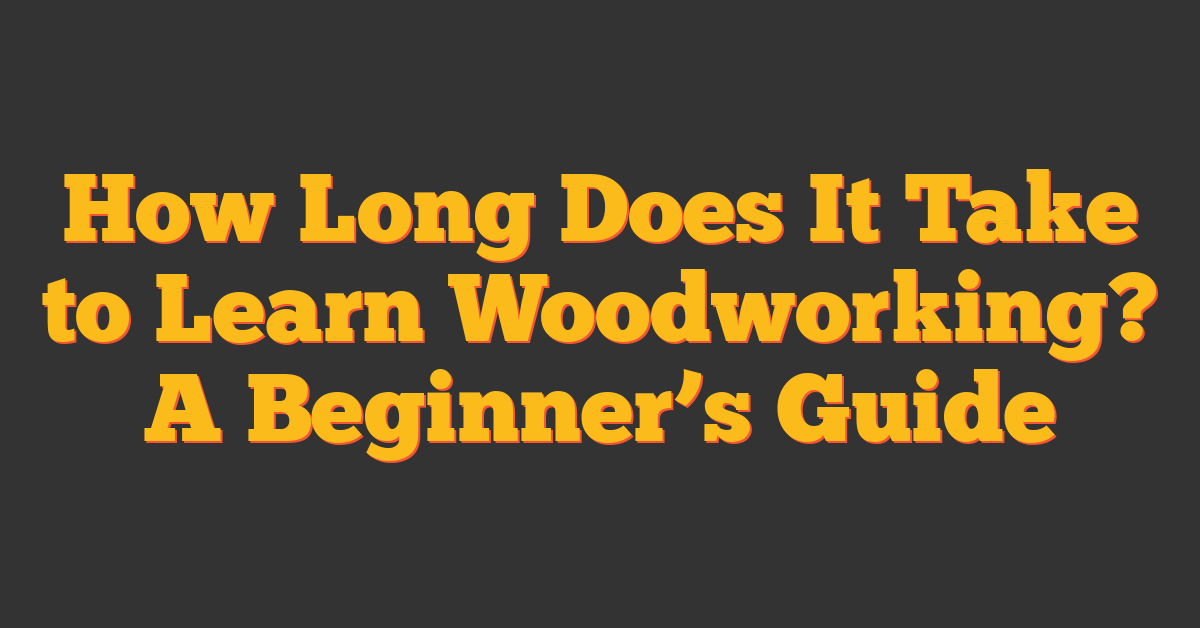Have you ever watched a master woodworker bring a piece to life and wondered how they do it? Imagine having a guide by your side, sharing secrets and techniques honed over years. Mentorship in woodworking offers you that unique opportunity to learn directly from the best in the field.
With a mentor, you’ll gain hands-on experience and insights that books or online tutorials just can’t provide. Whether you’re just starting out or looking to refine your skills, having a seasoned expert to support you can make all the difference. Let’s explore how finding the right mentor can elevate your woodworking journey to new heights.
The Role of Mentorship in Woodworking
Mentorship transforms your woodworking journey by providing personalized guidance and expert knowledge. Learning directly from experienced woodworkers accelerates your skill development and deepens your understanding of the craft.
Building Foundational Skills
A mentor ensures you acquire essential techniques efficiently. You learn proper tool usage, accurate measurements, and effective joinery methods from day one. Mastering these fundamentals prevents common mistakes, saving you time and resources. Additionally, mentors demonstrate best practices, reinforcing safe and productive workshop habits.
Fostering Creativity and Innovation
Mentors inspire you to explore new ideas and push creative boundaries. They introduce diverse projects that challenge your skills and encourage inventive solutions. By observing their unique approaches, you gain fresh perspectives and innovative techniques. This collaborative environment nurtures your ability to design custom furniture and tackle complex DIY projects with confidence.
Benefits of Having a Woodworking Mentor
Having a woodworking mentor transforms your crafting journey, offering guidance and support every step of the way. You gain invaluable insights that accelerate your growth and expand your connections.
Accelerated Learning
With a mentor, you grasp complex techniques faster by receiving hands-on demonstrations and immediate feedback. Mistakes become learning opportunities, ensuring you master essential skills like joinery and tool handling efficiently.
Access to Professional Networks
A mentor introduces you to a community of experienced woodworkers and suppliers, opening doors to collaborative projects and exclusive resources. Leveraging these connections enhances your visibility and provides opportunities for showcasing your work.
How to Choose the Right Woodworking Mentor
Selecting the right mentor enhances your woodworking skills and accelerates your growth. Follow these steps to find a mentor that matches your aspirations.
Identifying Your Learning Goals
Define the specific skills you want to develop, such as advanced joinery, furniture design, or tool proficiency. Outline the types of projects you aim to complete, like building custom cabinets, dining tables, or intricate wood carvings. Clear goals guide you to a mentor whose expertise aligns with your woodworking ambitions.
Where to Find Potential Mentors
Join local woodworking clubs or attend community workshops to meet experienced woodworkers. Participate in woodworking fairs, seminars, and exhibitions to network with professionals in the field. Utilize online platforms, including woodworking forums and social media groups, to connect with potential mentors. Engaging in these environments increases your chances of finding a mentor who fits your learning style and project interests.
Success Stories from Woodworking Mentorship
Discover how mentorship has propelled woodworkers to achieve remarkable success. Learn from their journeys and apply these insights to your own woodworking endeavors.
Renowned Woodworkers and Their Mentors
- James Krenov and Charles Hayward: Krenov’s collaboration with Hayward refined his craftsmanship, leading to international recognition.
- George Nakashima and Thomas G. Chinn: Nakashima’s mentorship under Chinn developed his signature organic wood forms.
- Norm Abram and Peter Follansbee: Abram’s apprenticeship with Follansbee honed his precision in cabinetry, establishing his expertise on television.
Personal Growth Through Mentorship
- Skill Enhancement: You master advanced joinery techniques through hands-on guidance.
- Confidence Building: You gain assurance in executing complex projects with a mentor’s support.
- Creative Development: You explore innovative design ideas inspired by your mentor’s experience.
- Problem-Solving Abilities: You learn to troubleshoot workshop challenges effectively with expert advice.
Conclusion
Finding the right mentor can truly elevate your woodworking journey. With their guidance you’ll navigate challenges faster and unlock new levels of creativity. Embracing mentorship means gaining not just skills but a deeper connection to the craft and the community. Whether you’re just starting or looking to refine your techniques a mentor can make all the difference. Take the step to seek out a mentor and watch your woodworking passion flourish.
Frequently Asked Questions
What are the benefits of having a woodworking mentor?
A woodworking mentor provides personalized guidance, hands-on experience, and expert knowledge that accelerate skill development. They help learners master essential techniques, prevent common mistakes, and reinforce safe workshop habits. Additionally, mentors inspire creativity, introduce diverse projects, and offer insights that go beyond what books or online tutorials can provide.
How does mentorship enhance woodworking skills?
Mentorship enhances woodworking skills through direct instruction and immediate feedback. Mentors demonstrate complex techniques, guide learners through hands-on projects, and help them understand proper tool usage and joinery methods. This personalized approach ensures efficient learning and helps mentees develop a deeper understanding of woodworking craftsmanship.
Can mentorship help prevent common woodworking mistakes?
Yes, a mentor can help prevent common woodworking mistakes by providing expert guidance and oversight. They can identify and correct errors in technique, offer tips on tool maintenance and safety, and share lessons learned from their own experiences. This proactive support ensures that learners build a solid foundation and avoid costly or dangerous mistakes.
How do I find the right woodworking mentor for me?
To find the right woodworking mentor, start by identifying your specific learning goals, such as advanced joinery or furniture design. Explore local woodworking clubs, community workshops, and online platforms to connect with experienced woodworkers. Engaging in these environments allows you to meet potential mentors who align with your aspirations and can provide the guidance you need.
What role do mentors play in creative development in woodworking?
Mentors play a crucial role in creative development by introducing diverse projects and encouraging innovative solutions. They inspire mentees to think outside the box, explore new techniques, and challenge their skills. This guidance fosters creativity and helps woodworkers develop unique styles and approaches in their craft.
How does mentorship expand connections within the woodworking community?
Mentors expand connections within the woodworking community by introducing mentees to experienced woodworkers, suppliers, and professional networks. These connections can lead to collaborative projects, increased visibility, and opportunities to showcase work. Building a strong network through mentorship enhances a woodworker’s career and community presence.
What personal growth can I expect from a woodworking mentorship?
A woodworking mentorship fosters personal growth by enhancing skills, building confidence, and developing creative and problem-solving abilities. Mentees gain a deeper understanding of their craft, overcome challenges with expert support, and grow more confident in their abilities. This holistic development leads to a more fulfilling and successful woodworking journey.
Are there any success stories of woodworkers who benefited from mentorship?
Yes, notable woodworkers like James Krenov, George Nakashima, and Norm Abram have benefited significantly from mentorship. Their mentors played pivotal roles in their development, helping them refine their skills and gain recognition in the woodworking field. These success stories illustrate the profound impact that mentorship can have on a woodworker’s career.
How does mentorship compare to learning from books or online tutorials?
Mentorship offers personalized, hands-on guidance that surpasses the passive learning experience of books or online tutorials. A mentor can provide immediate feedback, demonstrate techniques in real-time, and tailor instruction to the learner’s needs. This interactive approach ensures a deeper understanding and more effective skill acquisition than self-guided methods.
What should I look for when selecting a woodworking mentor?
When selecting a woodworking mentor, look for someone with expertise in your areas of interest, a teaching style that matches your learning preferences, and a willingness to invest time and effort in your growth. Consider their experience, past mentees’ success, and their ability to provide constructive feedback. A good mentor should align with your woodworking goals and inspire you to achieve them.




